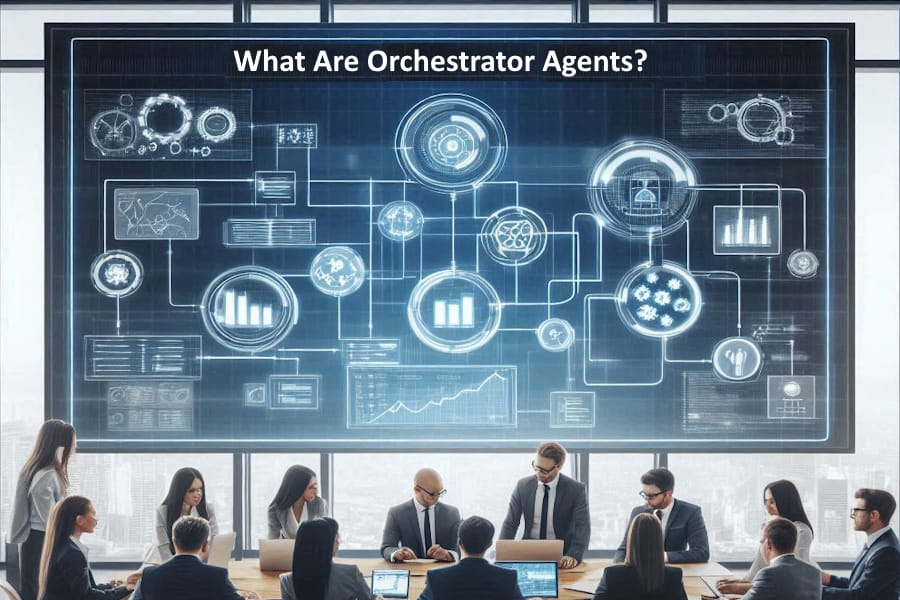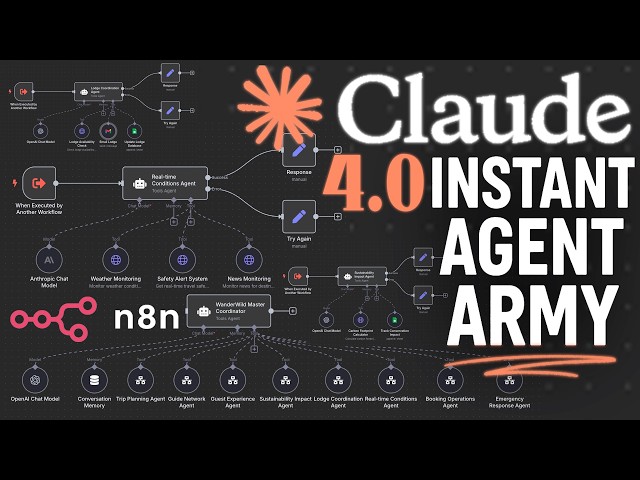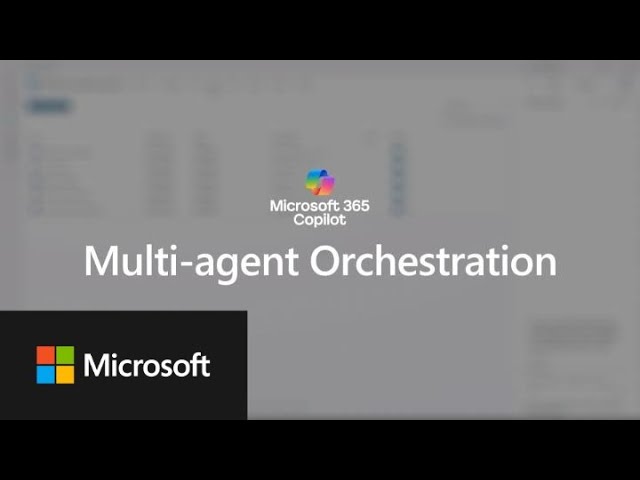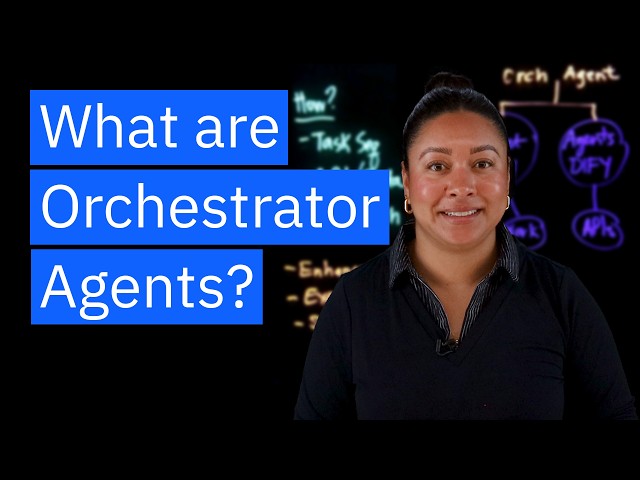Type: Article -> Category: AI What Is
What Are Orchestrator Agents?

Publish Date: Last Updated: 13th January 2026
Author: nick smith- With the help of GROK3
Orchestrator agents are specialized software components or intelligent systems designed to manage, coordinate, and optimize complex workflows, tasks, or processes across multiple systems, agents, or resources. These agents act as central hubs in distributed environments, ensuring seamless communication, task delegation, and resource allocation while maintaining efficiency and adaptability. They are increasingly vital in fields like artificial intelligence (AI), multi-agent systems, cloud computing, robotics, and enterprise automation.
This article explores the concept of orchestrator agents, their key functionalities, types, applications, and their role in modern technological ecosystems.
Understanding Orchestrator Agents
At their core, orchestrator agents are responsible for overseeing and coordinating tasks among various entities—whether those entities are other software agents, human operators, hardware devices, or cloud services. They function as decision-making entities that interpret high-level goals, break them into actionable tasks, assign these tasks to appropriate resources, and monitor their execution to ensure successful outcomes.
Orchestrator agents are distinct from traditional software in their ability to operate autonomously or semi-autonomously, often leveraging AI techniques such as machine learning, planning algorithms, or reinforcement learning. They excel in environments where tasks are dynamic, resources are distributed, and real-time adaptability is crucial.
Key Characteristics of Orchestrator Agents
-
Coordination: They manage interactions between multiple agents or systems, ensuring tasks are executed in the correct order and dependencies are resolved.
-
Autonomy: Orchestrator agents can make decisions independently based on predefined rules, learned behaviors, or real-time data.
-
Scalability: They are designed to handle large-scale, distributed systems, managing thousands of tasks or agents simultaneously.
-
Adaptability: These agents can adjust plans dynamically in response to changing conditions, such as resource availability or task priorities.
-
Interoperability: They facilitate communication between heterogeneous systems, often using standardized protocols or APIs.
How Orchestrator Agents Work
Orchestrator agents operate by following a structured workflow that typically includes the following steps:
-
Goal Interpretation: The agent receives a high-level objective (e.g., "optimize supply chain logistics" or "deploy a microservices architecture").
-
Task Decomposition: The orchestrator breaks the goal into smaller, manageable tasks, identifying dependencies and priorities.
-
Resource Allocation: It assigns tasks to available agents, systems, or resources based on their capabilities, availability, and performance metrics.
-
Execution Monitoring: The agent tracks task progress, ensuring deadlines are met and resolving any issues that arise (e.g., reassigning tasks if a resource fails).
-
Feedback and Optimization: After task completion, the orchestrator collects feedback, analyzes performance, and refines its strategies for future tasks.
Example Workflow
Consider an orchestrator agent managing a cloud-based microservices application:
-
Input: A request to deploy a new feature requiring database updates, API changes, and front-end modifications.
-
Task Decomposition: The orchestrator identifies tasks like provisioning cloud resources, updating the database schema, deploying API changes, and testing the front-end.
-
Resource Allocation: It assigns tasks to specific cloud instances, development teams, or automated scripts.
-
Monitoring: The agent tracks deployment progress, ensuring each task completes successfully before triggering the next.
-
Optimization: If a task fails (e.g., a server crashes), the orchestrator reallocates resources or rolls back changes to maintain system stability.
Types of Orchestrator Agents
Orchestrator agents can be categorized based on their domain, functionality, or implementation. Below are some common types:
-
Workflow Orchestrators:
-
Focus on managing business processes or workflows, such as automating enterprise tasks (e.g., invoice processing, customer onboarding).
-
Examples: Apache Airflow, Camunda.
-
-
AI Multi-Agent Orchestrators:
-
Coordinate multiple AI agents working collaboratively to solve complex problems, such as in autonomous vehicle fleets or AI-driven simulations.
-
Examples: Frameworks like AutoGen or custom-built multi-agent systems.
-
-
Cloud Orchestrators:
-
Manage cloud resources, such as virtual machines, containers, or serverless functions, to optimize performance and cost.
-
Examples: Kubernetes, AWS Step Functions.
-
-
Robotic Process Automation (RPA) Orchestrators:
-
Oversee software bots that automate repetitive tasks, such as data entry or report generation.
-
Examples: UiPath Orchestrator, Automation Anywhere.
-
-
Network Orchestrators:
-
Manage network resources, such as bandwidth allocation or security policies, in software-defined networks (SDN).
-
Examples: Cisco ACI, ONAP.
-
Applications of Orchestrator Agents
Orchestrator agents are used across industries to streamline operations, enhance efficiency, and enable scalability. Some notable applications include:
1. Cloud Computing
Orchestrator agents like Kubernetes manage containerized applications, ensuring high availability, load balancing, and fault tolerance. They automate tasks like scaling applications, deploying updates, and recovering from failures.
2. Enterprise Automation
In business process management (BPM), orchestrators automate workflows, such as processing insurance claims or managing supply chains, by coordinating tasks across departments and systems.
3. AI and Machine Learning
In multi-agent AI systems, orchestrators coordinate specialized agents (e.g., one for data preprocessing, another for model training) to achieve complex goals, such as building predictive models or optimizing logistics.
4. Robotics
In robotic fleets (e.g., warehouse robots or delivery drones), orchestrators assign tasks, optimize routes, and manage battery usage to maximize efficiency.
5. Telecommunications
Network orchestrators manage 5G networks, dynamically allocating bandwidth and ensuring low latency for critical applications like autonomous vehicles or telemedicine.
Benefits of Orchestrator Agents
-
Efficiency: By automating task coordination, orchestrators reduce manual intervention and speed up processes.
-
Scalability: They enable systems to handle growing workloads without compromising performance.
-
Resilience: Orchestrators can detect and recover from failures, ensuring system reliability.
-
Cost Optimization: By allocating resources efficiently, they minimize waste and reduce operational costs.
-
Flexibility: Orchestrators can adapt to diverse environments, from cloud platforms to physical robotic systems.
Challenges and Limitations
Despite their advantages, orchestrator agents face several challenges:
-
Complexity: Designing and maintaining orchestrators for large-scale systems requires significant expertise.
-
Latency: In time-sensitive applications, the overhead of task coordination can introduce delays.
-
Security: Orchestrators managing sensitive data or critical infrastructure must be robust against cyber threats.
-
Interoperability: Integrating orchestrators with legacy systems or proprietary platforms can be difficult.
-
Resource Overhead: Running orchestrators in resource-constrained environments may consume significant computational power.
Future of Orchestrator Agents
As AI and automation technologies evolve, orchestrator agents are expected to become more intelligent and versatile. Key trends include:
-
AI-Driven Orchestration: Advances in reinforcement learning and natural language processing will enable orchestrators to handle more complex, ambiguous goals.
-
Decentralized Orchestration: Blockchain and distributed ledger technologies may lead to decentralized orchestrators that operate without a central authority.
-
Human-AI Collaboration: Orchestrators will increasingly integrate human input, enabling seamless collaboration between human operators and automated systems.
-
Edge Computing: Orchestrators will play a critical role in managing distributed edge devices, such as IoT sensors or autonomous vehicles, in real time.
Orchestrator Agents on YoutTube

How to INSTANTLY Build An AI Agent Army in n8n with Claude
YouTube Channel: Mark Kashef

Orchestrate distributed AI Agents with Azure Functions | DEM541
YouTube Channel: Microsoft Developer

Multi-agent orchestration
YouTube Channel: Microsoft 365

What Are Orchestrator Agents? AI Tools Working Smarter Together
YouTube Channel: IBM Technology
Conclusion
Orchestrator agents are the backbone of modern automated and distributed systems, enabling efficient coordination, scalability, and adaptability. From managing cloud infrastructure to coordinating AI agents and robotic fleets, these intelligent systems are transforming industries by streamlining complex processes. As technology advances, orchestrator agents will continue to evolve, driving innovation and unlocking new possibilities in automation and AI.
Understanding and leveraging orchestrator agents is essential for organizations seeking to stay competitive in an increasingly automated world. Whether you're building a cloud-native application or optimizing a supply chain, orchestrator agents provide the intelligence and flexibility needed to succeed.
Latest What Is AI Articles
AI Questions and Answers section for What Are Orchestrator Agents?
Welcome to a new feature where you can interact with our AI called Jeannie. You can ask her anything relating to this article. If this feature is available, you should see a small genie lamp above this text. Click on the lamp to start a chat or view the following questions that Jeannie has answered relating to What Are Orchestrator Agents?.
Be the first to ask our Jeannie AI a question about this article
Look for the gold latern at the bottom right of your screen and click on it to enable Jeannie AI Chat.
Type: Article -> Category: AI What Is


